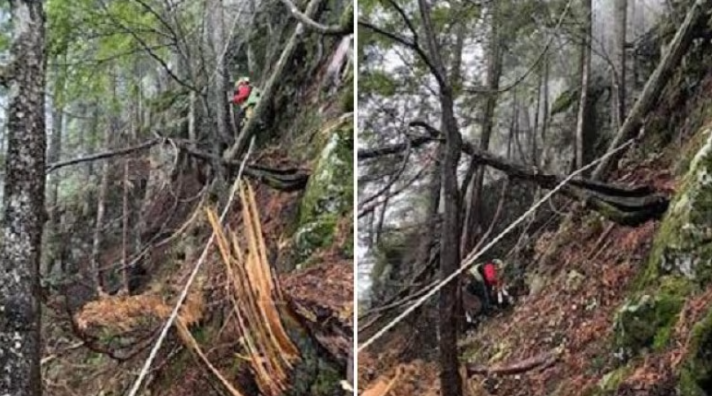Non-existent trail removed from Google Maps after another rescue in Vancouver’s North Shore mountains

2 hikers recently saved from steep, dangerous terrain north of Mount Fromme, North Shore Rescue says
A search-and-rescue organization says it has finally been successful in getting Google to remove a non-existent trail from its Maps app, after crew members were again called to pull a stranded hiker out of dangerous terrain in the North Shore mountains near Vancouver.
Both helicopter and rope teams with North Shore Rescue (NSR) were needed to save the male hiker who became stranded on the non-existent trail on the north side of Mount Fromme on Nov. 4.
NSR said it made a similar helicopter rescue in the same area on Sept. 20.
Google Maps displayed the non-existent trail as heading north from the summit of Mount Fromme — which is located just east of the popular ski hill of Grouse Mountain — toward the vicinity of Kennedy Falls, in what NSR describes as “extremely steep and dangerous terrain.”
“This morning NSR received word that our Google Map request has been processed and the non-existent trail north of Fromme has been deleted,” said NSR in a social media post.
“Thanks to Google for the update, and extra special thanks to the efforts of everyone further to our post this weekend!”
NSR said one week ago it had contacted Google about the problem but had not received a response. Volunteers even went to the trouble recently of posting signs in the area warning about the danger.
A third hiker fell to his death in the same area two years ago.
In last week’s rescue, NSR said crews had to be lowered into an area approximately 100 metres below the hiker because of low cloud limiting how high the helicopter could fly. Rescuers then belayed up to the hiker, who was put in a harness and taken down to a location where the helicopter could hoist him out.
CBC News has contacted Google for comment.

According to B.C. Search and Rescue Association senior manager Dwight Yochim, the fake trail has been a concern for a while.
“On Google Maps someone put a trail where there wasn’t a trail,” Yochim said on the CBC’s The Early Edition.
“So, people looking for ways to get up to various mountains [that] had never taken that trail, off they go. And it’s a major bushwhack with extremely steep, dangerous areas that just leads people into trouble.”
Yochim said the lesson is that Google Maps, while being a good tool for finding a coffee shop, should not be used for hiking.
He suggests hikers who use their phone to navigate should consider more accurate apps such as AllTrails, Gaia or Strava. His top recommendation, however, is using reliable, old-school options.
“I really like the map and compass. My map has never run out of batteries,” said Yochim, whose recommendation was echoed by NSR.
“Of course, if you do use your phone for navigation… be sure to carry a spare, charged external battery, as mapping programs can quickly drain your phone’s battery, especially in the cold,” the organization said on social media.
Related News
Trade war, slumping border traffic: What does that mean for the Gordie Howe bridge?
Amid U.S. President Donald Trump’s tariffs which have triggered a trade war with Canada, cross-border trips haveRead more
Trump administration threatens Harvard’s foreign enrolment, tax-exempt status
U.S. Homeland Security Secretary Kristi Noem speaks during an event on April 9, in Washington,Read more
